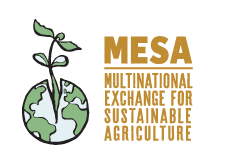By Kate Sylvan, Curriculum Development and Educational Programs
Last month, MESA hosted our first ever Sustainable Supply Chains Tour with two agricultural professionals from Nepal’s World Education organization. Many thanks to all of the MESA hosts and partner organizations who graciously hosted Sita Ram and Laxmi, who we are excited to partner with in the future.
The international NGO World Education is involved with a multitude of programs to strengthen local communities. It’s chapter in Nepal, especially the Kathmandu province where their office is located, is major area of brick production. Impoverished families, often subsistence farmers from all over the country, come as seasonal workers in the brick factories. The work making “blood bricks” is grueling—exceedingly long days, poor working conditions, low wages, and child labor. Whole families come to work in the factories each year, meaning their children miss school for half of the academic year. This can put children at a huge disadvantage compared to their peers. World Education offers flexible education classes focusing on nutrition and financial literacy for children in the factories.
World Education also helps support families to transition out of the exploitative factory work, into sustainable agriculture. Sita Ram and Laxmi are involved in these programs, conducting farmer field schools in different regions all over Nepal. Like the United States, Nepalese farmers have been challenged by industrial agriculture, and as a result of destructive farming practices, many farmers suffer from nutrient deficient, eroded soils. Farmer field schools focus on sustainable agriculture techniques to build up healthy topsoil. The schools follow a “train-the-trainer” approach, where a particularly capable student from one session is chosen and trained, and then conducts the next training, so the training is coming from the community. In the schools, farmers test different growing methods, often comparing different sustainable techniques in order to determine what works best for their particular area. World education also conducts financial literacy training, and helps farmers join financial cooperatives.
Sita Ram and Laxmi wanted to learn more about small farms in the Bay Area; specifically the challenges farmers face, how community organizations support small farmers, and what sustainable supply chains can look like. MESA is blessed to have many community partners and host farmers who graciously hosted us, told us about their work, and answered our questions—all in the middle of the busy harvest season!
We talked to farmers, like Steven and Sam at SoMar Farms, and Andrew at Double 8 Dairy (a water buffalo dairy), about the challenges they face as small farmers. We spoke to Thea Rittenhouse at NCAT, Julia and Paulette at UC Cooperative Extension, and Louis Sierra and the team at the California Center for Cooperative Development about how different organizations are supporting farmers in Northern California. At Earl’s Organics and The Natural Grocery Company, we learned how new supply chains have been developed in order to support small farmers. At the Frank Howard Memorial Hospital, we spoke to Farmer Ananda and Chef Kyle about their innovative project to shorten the supply chain by growing most of the organic produce for the hospital cafeteria!
It was inspiring to hear from so many passionate people who are working to create a sustainable and just food system. At the School for Adaptive Agriculture, lead educator Ruthie King compared notes with Sita Ram and Laxmi about Farmer Field Schools. While worlds apart, their schools face similar challenges—how to help farmers create financially sustainable farm businesses, and how to inspire more young people to become farmers.
My favorite moment came during our tour of the Golden Rule Garden. Four MESA stewards taught us the 8 principles of Grow Biointensive Agriculture in a hands-on demonstration. Sammy from Kenya, Olawumi from Ghana, and James and Sharon from Canada shared knowledge, stories, and laughter with us. It was so inspiring to see MESA’s global network of farmers and food change-makers grow and collaborate together in such a tangible way.
While the situation for subsistence farmers in Nepal is quite different from small farmers in Northern California, there were common challenges and needs. Farmers everywhere are threatened by the power of industrial agriculture, and we need more young farmers. We hope that in the future, MESA and World education can work together to tackle some of these challenges!





